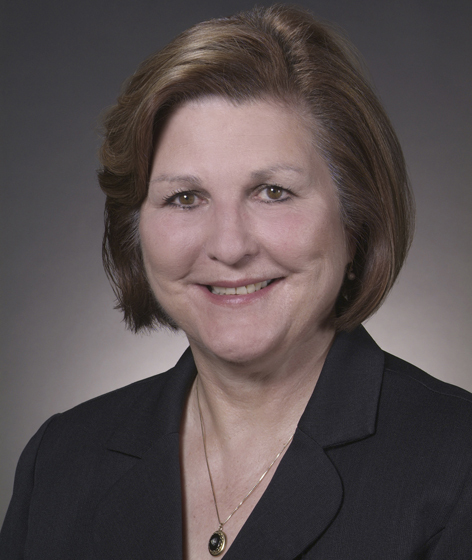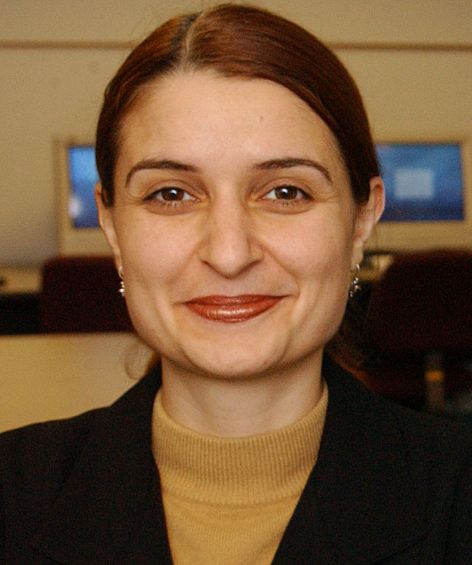AMES, Iowa – The Republican Party of Iowa conducted its final meeting of the Iowa Caucus Review Committee this week to approve final recommendations for improving the caucuses. And a pair of Iowa State University researchers could tell them where caucus-goers went to get their political information.
Using data taken from the two Iowa State University/Gazette/KCRG polls conducted late last year -- the first a survey of 1,256 registered voters (979 Republicans, 277 Independents), and the second a survey of 940 registered respondents (740 Republicans, 200 independents) -- Dianne Bystrom, director of Iowa State's Carrie Chapman Catt Center for Women and Politics; and Daniela Dimitrova, an associate professor in the Greenlee School of Journalism and Communication, have determined the political information sources of Iowa caucus-goers. And the big winner continues to be television.
The ISU researchers found that 60 percent of Iowans surveyed in November and 62 percent in December reported watching television (cable, network or local) as their main source of political information leading up to the caucuses. That compares to 67 percent of Americans who reported that television was their primary source of campaign and election news in a March 2011 report released by the Pew Research Center's Internet and American Life Project.
But compared to the national survey that found that 24 percent of American adults got most of their campaign information from the Internet during the 2010 midterm elections, just 8 percent of Iowa respondents relied on the Internet for information prior to caucus night in 2012.
Media sources that best predicted caucus turnout
In addition to surveying media use by Iowa voters, the researchers analyzed which political information sources best predicted their likelihood to attend the 2012 Republican caucuses. They found that respondents who listened to the radio or visited candidate/political party websites for political information were more likely to report that they would attend the causes.
"Our study shows that social media does not appear to have played a large role in turning out participants in the 2012 Republican Party caucuses," Bystrom said. "Previous studies showed that the use of social media among Iowans prior to the 2008 caucuses was fairly high, leading us to speculate that Democratic caucus-goers may rely more on social media for campaign information than Republican caucus-goers."
Bystrom presented the results of the research earlier this year at the Iowa Association of Political Scientists meeting. Dimitrova and Bystrom have also authored another paper, titled "The Effects of Social Media on Political Participation and Candidate Image Evaluations in the 2012 Iowa Caucuses," which they'll present at the Association for Education in Journalism and Mass Communication annual conference in Chicago August 9-12.
The ISU researchers cite three reasons why social media use may have been so low in their survey polling data:
- The respondents tended to be older Iowans (mean age of 61.89), who even on a national scale don't use social media as much as younger citizens.
- People tend to use social media when they don't have personal interaction with the candidates, and Iowans have more than double the national average of personal interactions with presidential candidates. "Those meetings seem to be more important than social media in turning out participants," Bystrom said. "So Iowans don't need to rely on social media or even more traditional forms of media as much as your average voter."
- Respondents were well educated, on average (33.5 percent with some college), and closely followed the campaign in Iowa. Previous research has found media effects for both traditional and online media may be stronger for less educated citizens and those who pay less attention to politics.
Social media's role in candidate assessment
Although Dimitrova found that social media use was not related to respondents' likelihood to attend the Iowa caucuses, it was related to their evaluation of the candidates on such image characteristics as honesty, intelligence and leadership.
"For instance, viewing YouTube videos had a negative impact on candidate evaluation while following political candidates on Facebook had a positive effect on candidates' intelligence and leadership ratings in some cases," Dimitrova said.
"I think the use of social media will be more prevalent in the general election than it was in the Iowa caucuses for Republicans," Bystrom said. "Because President Obama is so savvy in using social media and his campaign relies on it, the presumptive Republican candidate, Mitt Romney, needs to enter that realm of campaigning to also run successfully against Obama."
Also contrary to national surveys on sources of political information, the ISU researchers found gender differences between Iowa men and women on their use of the Internet. While the national surveys have found that women and men turned to the Internet for their political information nearly equally, Iowa men were significantly more likely to use the Internet for political information than Iowa women in the Iowa State University/Gazette/KCRG poll sample.

